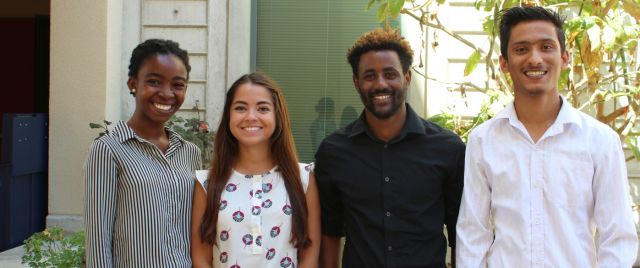Due to the spread of the Covid-19 pandemic, the 2020/2021 summer program has been cancelled. We expect to offer the program in the summer of 2022.
Summer Biotechnology Undergraduate Research Experience

2017 participants, from left to right: Amoge Ezike, Arianna Avellan, Temesgan Fiseha, and Sakar Paudael
Program Details
The ICB Summer Research Program will run from June – August, 2022. Approximately 6 internships will be awarded. The stipend is $4,500 total for 8 weeks. The internship is a full-time commitment and participants are not allowed to attend summer courses during the program. No housing is provided.
The selected participants will work in teams of two—one UCSB student and one CC student. Each team will be selected to work on one of the projects listed below:
Prof. Javier Read de Alaniz, UCSB Chemistry
DASA-based Photochromic Materials for Load-bearing Applications: Emulating Nature’s Design to Build Light-addressable Actuators
The ability for materials to change properties and/or functions in response to external stimuli is intrinsic to biological systems; however, incorporating such advantageous properties into useful materials represents a significant scientific and engineering challenge. The goal of this project is to develop a new approach to create light-activated artificial muscles from a novel class of photochromic materials. The summer internship may take several directions, such as: 1) determining how molecular design and polymer architecture influence the ability of these novel molecules to generate and bear loads; or 2) investigating how properties such as modulus, toughness, strength, architecture, etc. influence light-stimulated volumetric changes of these polymeric materials. Relevant majors: chemistry, physics, mechanical engineering.
Prof. Barry Giesbrecht, UCSB Psychological & Brain Sciences
Global States and Cognitive Priority Control
Perception and cognition determine the way we see and act on our environment. Developing methods to monitor and detect changes in perceptual and cognitive states to optimize soldiers’ performance is of critical importance to the U.S. Army’s strategy. This project will investigate the effects of global behavioral states (e.g., motivation, arousal, fatigue, sleepiness) on perception and cognitive priority control, building on our past findings that have shown that even modest changes in physical state (e.g., riding a bike) have selective effects on behavioral performance in cognitive tasks (e.g., target detection, visual search). Relevant majors: neuroscience, psychology, engineering.
Prof. Michelle A. O'Malley, UCSB Chemical Engineering
Engineering Sense-and-Respond Enzyme Complexes for Bioproduction
Extraction of sugar is the rate-limiting step in converting unpretreated biomass into value-added products through microbial fermentation. Both anaerobic fungi and anaerobic bacteria have evolved to produce large multi-cellulase complexes, referred to as cellulosomes, which are powerful machines for biomass deconstruction. To date, only bacterial cellulosomes have been explored for bioprocessing. However, fungal cellulosomes have evolved unique abilities to hydrolyze more recalcitrant biomass, host a wider range of enzymatic diversity, and are able to “shuffle” their enzyme domains on demand in response to external queues. This project will merge proteomic characterization with sequencing and molecular modelling to learn how fungal cellulosomes are assembled and rearranged in their native system. Relevant majors: chemical engineering, bioengineering, chemistry.
- Student Eligibility
-
This competitive research program is open to undergraduates who are US citizens or permanent residents, 18 years or older. Students must be enrolled full-time at UC Santa Barbara or at a California Community College. UCSB students must have a GPA of 3.5 or higher; CC students must have completed a minimum of 12 transferrable semester units in science, mathematics or engineering at the program start.
-
Application Requirement
-
- A Complete Application
- A Statement of Interest explaining your research interest, background, and how this internship fits into your career goals. Your essay should be typed and a maximum of one page long.
- A Copy of your Unofficial Transcript
- One Letter of Recommendation from a course instructor, TA, or employer who is familiar with your scientific skills.
Program Dates
June - August, 2022
Application Deadline
January 31, 2022
